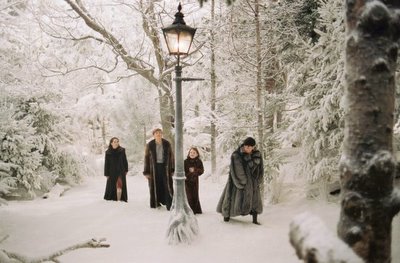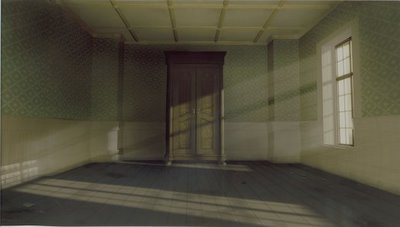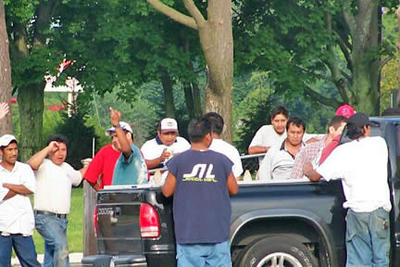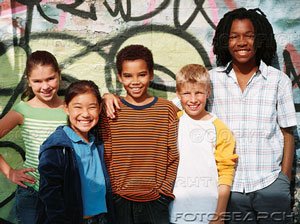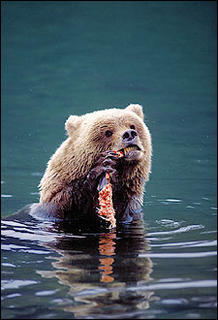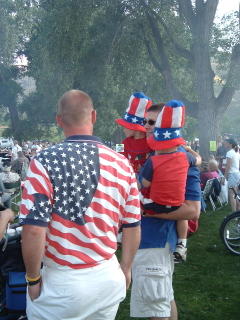Around the World Winter 06
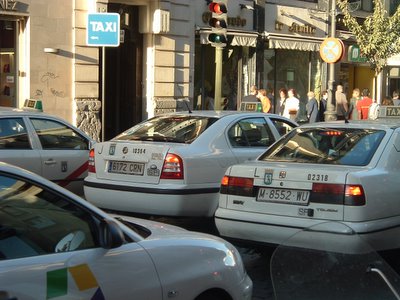 Madrid Taxis
Madrid TaxisI’m finally sorting out the trek notes from my North Africa trip this past fall and thought I'd pass on some of my impressions and pics.
Que Ciudad!
On the way to work in Morocco I had a short layover in the Old World.
Madrid is a striking city. I wish I’d had more than 48 hours to take it in.
I’m a veteran “urban trekker,” though, so two days gave me enough time to get a feel. I covered over 20 miles on foot around town and had a great time. Probably even lost a pound or two.
Anyone traveling in Europe can’t help being impressed with the real affection the locals have for their cities. Madrid is a case in point.
You can see it in the dogged determination to hang on to historically significant buildings and neighborhoods, in the reverence for place that drives meticulous efforts to highlight beauty at every corner, and in the way Europeans actually “live” in their public places. Parks and plazas and streets are always full of people hanging out and enjoying the pleasure of being around other people.
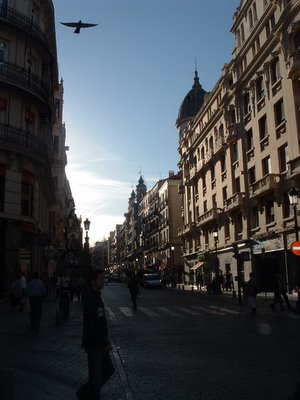
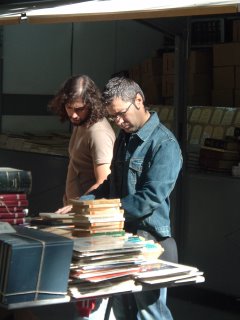

It’s not that we Americans don’t like our cities.
But it seems we’re more ambivalent about our urban scapes.
We sort of like them and are willing to hang out with each other in movie theatres or malls or in stadiums.
At the same time, we’re willing to let cities deteriorate or die if it “makes sense” to do so and--in general--we seem to have a lot less trouble scraping even the most important buildings or sites.
A pretty interesting difference. You can’t help but notice it.
I kicked back in my room after the two day trek and watched a little television the night before heading out.
Didn’t have many choices so I ended up watching a local game show.
Some of it was familiar since it was very loosely based on “Jeopardy.” The production values were current.
The host could have passed for conventionally hip here. Slightly overweight, 30-ish, ironic and pleasant, soul patch, male pattern baldness, stylized 50’s bowling shirt and 60’s IBM ‘scientific management” heavy frame glasses.
The contestants had to answer detailed questions about various neighborhoods around Madrid. It was pop culture stuff along with the most specific questions about history and geography and architecture and current events.
If you didn’t know the city in great detail you got embarrassed.
The people on the show knew their stuff.
I guess that wasn’t so surprising. Any show can find individuals that will make the grade.
What surprised me was that the show is a big hit in Madrid. Again, Europeans may value their cities more than Americans.
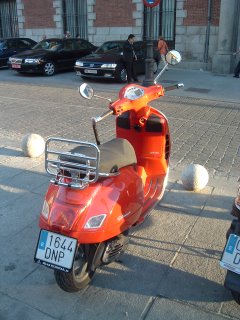
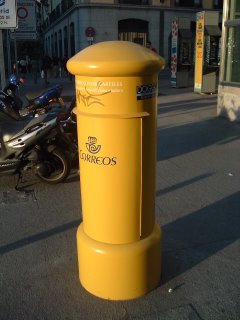
If a show like that ever made it in a place like Los Angeles, contestants would have to know who built the Watts Towers or give the exact street corner of the giant stucco doughnut atop Randy’s in west LA.
I can answer both of those questions—even after moving out of town two years ago—so I guess in at least some ways I’m a European at heart.
The Color of White
Many European cities are full of millions of white people.
I guess that shouldn’t be too surprising. But it really is for an American traveling in Europe.
A place like Madrid can feel exotic to a New World citizen because most of our cities are so "racially diverse.”
Even a city like Minneapolis—the frozen home of powder milk biscuits that help Nordic Protestants do what needs to be done—can come across like the capital of the 3rd world compared to some places in Europe.
By nature I tend to look for difference and diversity, but like most Americans, I’m used to a racial and cultural idiom of white, black, brown, red and yellow.
Madrid, where pretty much everybody in the central city is “white” according to that simple “crayola crayon” world view, moves you into distinctions often lost in America.
I saw “white” people with dark brown eyes, light brown eyes, light green eyes, dark green eyes, light blue eyes, and dark blue eyes. Even red eyes post vino.
Every shade and hue of blonde hair, red hair, brown hair, black hair and sometimes blue hair among the grannies. Straight hair, wavy hair and kinked hair. Thin hair and thick.
Dark brown skin, light brown skin, pinkish skin, reddish skin, pale skin and pale skin with freckles.
Then you’ve gotta take the different eye, skin and hair colors and textures and mix ‘em and match ‘em into cool and complicated combinations to do justice to the actual people on the street.
Is there another “racial” group with more physical diversity than “white” people?
Makes you wonder if there’s more to things than the crayola thinkers imagine.
At the very least it makes “white people watching” in Europe pretty entertaining.

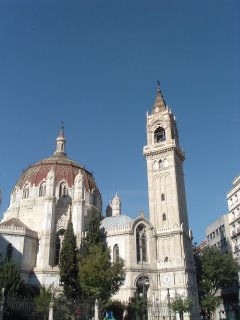
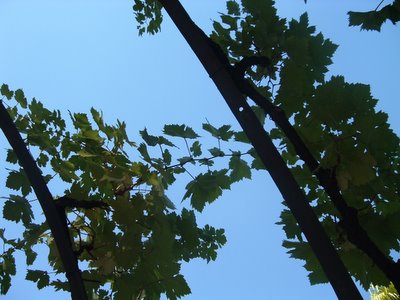
Lithping with the Betht of Them
I’ve noticed that people of various Spanish speaking nations are convinced that their version of Spanish is superior to others.
My family and I lived in Guatemala many years ago for a number of months doing intensive language study.
The Guatemalans laughed out loud at the way Mexicans speak Spanish, and some Argentines I met there thought that Guatemalan Spanish barely qualified as “civilized.”
Turns out Castilians are the cockiest of the lot.
My feeble attempts to speak the mother tongue provided amusement for more than a few of the locals I ran across.
They asked me about my “Mexican/American” accent with a knowing smile and encouraged me to soften my ‘c’s.’ In Castilian Spanish a name like “Garcia” is pronounced gar-thee-ya rather than gar-see-ya.
Ath a rethult, everybody thounds like they’ve got a lithp.
By my thecond day I wath lithping with the betht of ‘em.
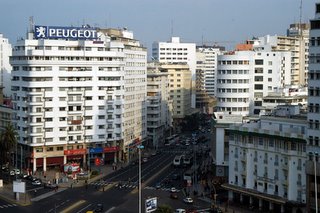 Place des Nations-Unies
Place des Nations-UniesRamadan at Rick's
Pretty much everybody in the US knows Casablanca in the landscape of our imaginations.
The city is cool 40's snap brim fedoras and foggy airports. Clipped and clever dialogue. Homely anti-heroes and conflicted beauties who love them. World weary wisdom and passionate heroic intensity. Bogart and noir. Rick's Cafe Americain. Mysterious and worldly Arabs.

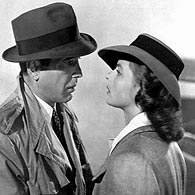
That last part's the thing.
While I was doing my due diligence I heard about the "worldly Arabs" of Casablanca from a lot of experienced folks in Morocco.
The Moroccans were supposed to be a pretty "user friendly" Islamic people, with the Casablancans the most western of all. I was expecting a toned down take on the kind of Islamic religious zeal that has Americans worked up into a pseudo-religious frenzy.
In some ways that view is pretty true.
Casablanca looks more western than most cities in the Islamic world. And judging by the way some of the fashionable young men and women dress it's not your father's Caliphate. At first glance it's more Ayatollah of Rock-n-Rolla than Wahabi worldview.
I got in country at the start of Ramadan. When in Mecca do as the Meccans. I decided to keep the dawn to dusk fast as best I could while there.
Christians once valued fasting as a way to discipline desire and open a pathway to what might be.
Western believers largely dropped that discipline long ago and put their faith and money on an overflowing marketplace. So spending time in a place where lots of people ritually and socially deny themselves something as basic as food was new for me.
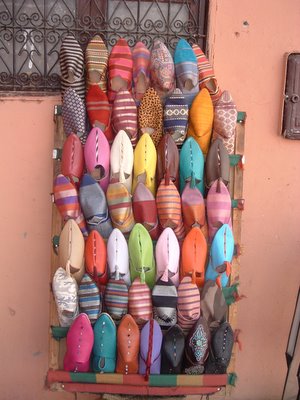 Traditional Shoe Sale
Traditional Shoe SaleWhen I'm traveling I normally buy my food at local markets. It's a good way to save money and get a better feel for the place. But shopping at a downtown supermarket in Casa during the fast was even more revealing than usual.
The place was packed out with eager folks getting food for the “break-fast” meal at dusk when everybody chows down after starving all day.
Every city in Morocco has a slightly different official breakfast time, often announced with loudspeakers or sirens. In Casa you can start downing the couscous at 6:30 pm sharp.
Anyway, folks went out of their way to look their best even though I knew they were suffering from hunger pangs and even dizziness since it was about 3 pm. Muslim people consider personal cleanliness of the utmost importance, a fact I learned firsthand a few years ago when--after walking around the hot and dirty streets of Cairo for hours--a good natured young man pointed out my need for “a more effective deodorant.”
Everybody looked sharp and clean, with about half the people wearing more traditional clothes and the other half wearing the west. And nobody seemed noticeably out of sorts, something I observed in most of the people I met during the fasting hours throughout Morocco.
Check out lines in the developing world will normally test the patience of even the Dalai Lama. This market was no different. I was in the “express” lane, which meant I had a chance to get through a ten person line in 20 minutes instead of 30 minutes. But even in lines moving at geologic speeds, folks were positive and unruffled.
Well, except for me. By that point my stomach was grumbling and my glucose stores were pretty much burned up. Feeling dizzy and a little on edge, the last place I wanted to be was squashed among the pious and cheerful in a hot, humid market. By the time I got through the line I secretly wanted to wipe the annoyingly pleasant expressions off a few of their faces :^) I realized at that point that I had a few things to learn from my temporary neighbors.
Beyond people’s dignified and pleasant demeanor, though, the most impressive thing about Ramadan in Casablanca was the simple fact that everyone observed the fast. Or at least, everybody I ran across got with the spiritual diet.
No sign of anybody trying to sneak a mini-chocolate donut on the sly. No restaurant or café open between dawn and dusk (well, with one exception). No sidewalk food peddlers. No smells of food cooking. Nada. For a westerner, it's almost inconceivable to spend all day in a big city without the sights and sounds and smells of food and of people eating.
Human nature being what it is, I'm sure lots of folks in the city were doing potato chips and Snickers bars when nobody else was looking. And I'd guess some families in the high end suburbs got their three squares behind their high walls. But none of that is immediately visible to a person spending a week on the streets among Casablancans.
Hollywood visions of Casablanca aside, and in spite of Casa’s French colonial roots, the reality is the vast majority of folks there are deeply committed Muslims. So much for the “worldly Arab” reputation. Maybe Casa is ‘more western’ than some other cities in Morocco and the Islamic world, but it’s a place of serious faith and practice by any western standards.
I sometimes hear these days about the beginnings of a Muslim “Reformation” or even a Muslim “Enlightenment.” Some people believe that Islam will join Christianity and Judaism as a faith thoroughly modified and re-interpreted to make it more compatible with secular modernity, capitalism and democracy.
Well, maybe. But from my experiences in the Islamic world, I wouldn’t hold my breath that will happen anytime soon.
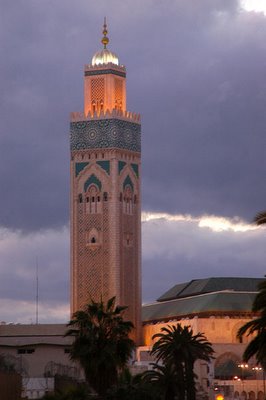 Hassan II Mosque
Hassan II MosqueI don’t want to give you the impression that I faithfully kept my short-term fasting vows, because I didn't.
On my last day in town, after walking for a few miles along the “Corniche,” the developed water front and beach area in the western part of the city, I got so dizzy by late afternoon that I just had to get some food. But nothing was open. What to do?
I walked north--head hazy and stomach growling--for about another mile until I saw what looked to me at the time like a vision of splendor.
It was The Golden Arches. If there was any restaurant in Casa that would probably ignore Ramadan, McDonald’s was the place.
McMaroc is the local tag for a worldwide franchise that has simply kicked Mohammed's booty. Current score: 99 billion served to 1.3 billion believers.
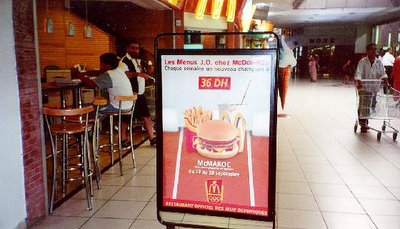 McRick's
McRick's And sure enough, it was open for business. So I knocked down a meal along with some other happy infidels.
Now, I’ve probably eaten at McDonald’s ten times as an adult. Yes, it’s possible for an American to achieve this. I've never liked fast food, even as a kid.
But I’ve never been happier walking through the doors of a restaurant than I was walking into that air-conditioned ka-ching! sanctuary. I’ve never been so grateful to see such disregard for religious values and traditions.
It was a beautiful sight.
I guess hunger can re-arrange the mind wonderfully :^)

New Convert
I've never been much of a picture taker. I've always prefered to replay events in my mind rather than through photos or videos.
Visual memories stored in your mind get layered with emotion and interpretation and all kinds of other good things that turn them into a pretty rich mixture. Photos or videos sometimes seem too literal a medium for satisfying memories.
I'm a medievalist in some ways and I freely admit it.
But I've been getting more into picture taking recently. The only explanations I can give for my change of attitude are my ageing brain and digital cameras.
The problem with rich and layered visual memories as you get older is that they get stuck in some inaccessable corner of your brain where you can't get to them. All you soft lens contact wearers will recognize the experience of one of your dried-out contacts folding up and disappearing somewhere underneath your eyelid and around the corner of your eyeball.
That's pretty much what happens eventually with visual memories. You can't remember what people or places look like anymore. Sometimes--as you get into your 40's--you can hardly remember what you looked like at 20 as you stare into the mirror and wonder who this old guy is standing in the bathroom wearing your clothes. So pictures and videos can be a pretty good reminder that jump starts all that layered good stuff again.
And digital cameras just make the whole thing so easy....
Cross-cultural Pics?
I travel a lot internationally and picture taking in the two-thirds world is a whole different thing.
My work gets me into overseas slum communities. When I'm there I generally avoid taking pictures. Carrying a camera tends to create a certain distance with my hosts. Most people in the developing world associate picture taking with tourists or journalists and that's the last thing I want to communicate. Understandably, too, people living in urban poverty aren't normally thrilled about having folks snapping pictures of their difficult circumstances.
But aside from the connotations of tourism or poor folk's discomfort with photography, people in a lot of cultures just don't like to have their picture taken, period. Not everybody loves the camera as much as Americans do.
Quick Pics
Folks in Morocco frown on taking photos of people. And forget about getting easy pics of religious buildings of any kind.
That's a pain because religious structures are pretty much the only interesting architecture among the miles of butt ugly buildings in most developing world Islamic cities.
Some of those social restrictions are due to current Morrocan culture and some to the long-term influence of Islam which forbids human representation in art.
So if you're going to get some pictures of people (I just avoided religious buildings other than the Hassan II Mosque) you've gotta be stealthy and quick and ready for a lecture or two when you get caught camera in hand.
I've developed my own little idiosyncratic method for just such occasions.
Once you see what you want to photograph, you figure out the shot in your head. Then you turn your back to it with camera concealed under your crossed arms. You get the camera ready and get your finger on the button and ready to shoot. Then you quickly spin clockwise--if you're a right hander--in order to face the object or person and all in one motion bring the camera up to your face. Sort of like the motion you'd use to throw a frisbee except you keep your elbow in a lot closer to your body.
Line it up quick and bam! snap the shot.
Then quickly swing the camera behind your back and move off at a brisk pace.
With a little practice you can do the whole thing with one fluid motion in 3 or 4 seconds.
Yes, I agree. It's pretty embarrassing what a grown man will do sometimes to get a picture.
And like I said, no matter how careful you are to avoid offence, once in a while you'll face the judgment of a local. Just after I took the picture of the vegetable and fruit souk (market) above I headed quickly through the crowds thinking I'd gotten the shot off with no fuss or muss. But an older woman about twenty yards away must have seen me and she gave me her two dirhams worth in Arabic. I'm glad I couldn't understand her, though I'm guessing it had something to do with knuckleheads and Americans....
Strike a Pose
In contrast to the cultural consensus in these places, some locals make a living being photographed. Since it's hard for the average tourist to get good pictures of local people they'll pay a premium to snap one of these "professional voguers."
I really got an introduction to the Moroccan version in Marrakech.
Usually the "peevees" wear some kind of colorful indigenous clothing or do something "exotic." In Egypt these guys dress up like some romantic Bedouin Sheik and ride a camel. In Morocco they wear traditional Moroccan footware--kind of a pointy slipper deal--and "charm" snakes and strike a 1001 Arabian Nights pose.
The snakes are highly venemous cobras, though skilled handlers suture their mouths shut with medical filament just before showtime. Some tourists don't know that and I saw a few fearful and panicky looks on people's faces.
If you whip out your camera these guys are on you in a second speaking good English, Spanish, French, or German and demanding a fee for service. Once you pay up and take your shot, they jump on you again and coax your camera away from you so they can take a shot of you with the snakes in the background. After they snap the shot they double dip you and demand a further fee.
Not a bad joint.
Maybe lean and pacifistic European tourists in the U.S. would pay for pictures of "exotic" American voguers striking a pose with greasy fast food in one hand and a legal assault rifle in the other. I'm surprised nobody at Venice Beach has done that take for cash :^)
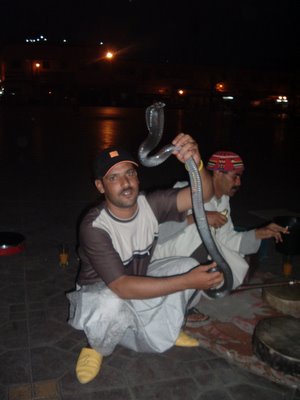 Pro Vogueing
Pro Vogueing The Airport as Destination
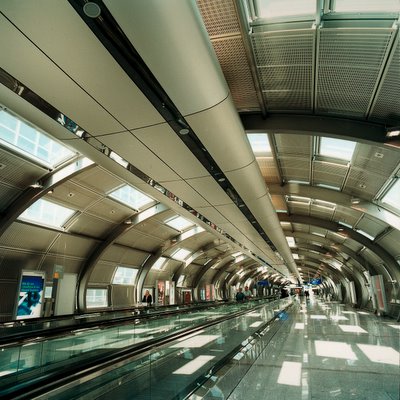 Frankfurt Airport
Frankfurt AirportTravel writers do some of the best writing on the market today, but I’ve always been surprised at how little attention they give to airports.
If you do long distance international trips you spend a lot of time on the ground between flights. Ten hour layovers aren't out of the question.
I ended up stuck in Frankfurt Airport for almost 8 hours on the way back home from Morocco.
Seeing the suffering of poor urban slum dwellers is one thing, but experiencing the inconvenience of first world travel is quite another :^)
Privileged Ranting About Airports
International airports tend to bite.
Here’s my shot at a long distance travelers’ hierarchy of wants:
• Food
• Sleep
• Getting clean
• Exercise
Food’s a no-brainer of course.
When you’re trying to catch up on lost sleep or trying to adjust and readjust your body clock to your destination, getting some sleep at the right time can be pretty useful.
Few activities get you stickier than long distance travel.
And when you’ve been jammed in a seat for 12 hours next to a 230 pound fat guy with the seatback in front of you lowered into your knees, moving around and getting some exercise when you get off the plane can be pretty helpful.
How do most airports score in providing for those desires?
• The food sucks but at least it's expensive.
• Very few airports make a place for economy passengers to rest or sleep. Heathrow in London, which is probably the best international hub, provides relatively quiet sleeping lounges with comfortable chairs that will lay back and let you snooze. I can’t think of another major airport with something similar.
• Getting clean? Forget about it. Again, Heathrow provides a shower area where you can get a towel and a shower for a small price, but I know of no other major airport that offers that kind of service.
• If you want to get loose or exercise, you can either do your stretching or yoga on the carpet in front of your gate or walk in circles from terminal to terminal. McCarran Airport in Las Vegas has a 24 Hour Fitness right in the airport that travelers and airport employees use. Haven't seen that before or since.
Given the emphasis on customer satisfaction and the rise in international travel over the past 10 years, you might those kind of innovative services would be the standard around the world, but not so.
Cruel and Usual Punishment
I could have used a snooze for 4 or 5 hours in Frankfurt to begin resetting my body clock back to Mountain Standard Time in the US, so I asked around to see if they had a sleeping area. Happily, I found an official who told me I was in luck and pointed me in the right direction.
The “rest area” turned out to be a series of lounges set up right next to the main walkway between two terminals.
The designers made the walkway out of hard plastic material studded with circular bumps to increase traction. It created a thunderous sound when anybody dragged their luggage on wheels across it. Multiply that sound by crowds and you’ve got some idea of the acoustics of naptime. It was a little like trying to grab z's next to the Santa Monica Freeway during rush hour.
But that wasn’t all. The German engineers responsible for my suffering that day had even more in store.
Along the length of the rest area they installed bright overhead lights and high powered AC ducts in the ceiling, so you got a double whammy of bright light and frigid air blowing directly onto your body.
The lounges themselves may have been the most unkind touch of all.
They looked pretty cool from an aesthetic point of view. Sort of an edgy “Batman” thing with lots of pseudo black leather and sharp angles and an exposed aluminum frame.
They were about as comfortable as that sounds. Rumsfeld probably uses a similar design at Guantanamo.
Laying there exhausted due to sleep deprivation, I tried to block out the noise and light and cold along with the metallic sharp ends jabbing me in the wrong places.
After about an hour I was giggling semi-consciously at my situation.
After about two hours I was ready to confess to pretty much anything.
"Water boarding" or attack dogs couldn't have done more to break a person's spirit than the Frankfurt International Airport Rest Area. I guess being privileged is pretty hard sometimes.
Duty Free Hammer
I was pretty impressed with Teutonic consumer protection laws. The straight talking Germans don't mess around.
All the cigarette cartons in the duty free shops at the airport carried warnings in huge block letters that covered up most of the brand name. A few of the subtle messages:
Smoking Kills!
and
Smoking Destroys You and Those Around You!
and finally, my favorite that didn't quite make it cleanly into English
Smoking Damages the Sperm!
Achtung baby!
